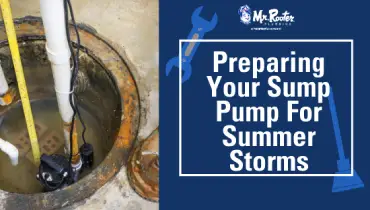
You made it through winter and are ready for warm breezes and rising temperatures. Now is the perfect time to prepare for storm season by focusing on your sump pump. A sump pump helps you maintain a dry lower level, which is vital for a variety of reasons. Sump pumps allow you to turn ground-level and below-ground rooms into attractive living spaces. The sump pump also reduces lingering moisture, especially when combined with a dehumidifier.
How can you make sure your sump pump is ready to handle storms and downpours? Follow these summer plumbing maintenance steps before and during storm season.
1. Make Sure the Sump Pump Is Connected to a Working Outlet
You would be surprised by how many homeowners discover their sump pumps are unplugged or plugged into an outlet that no longer gets power. Your sump pump relies on electricity to kick in. If you have problems with the outlet, call an electrician to diagnose the situation.
2. Verify That the Sump Does What It Should When Filled
Open the lid of the sump pump and pour in enough water to make the float move upward. An operational sump pump will kick in immediately and begin moving the water outside the home. Not getting any response? Unplug the unit and then plug it back in. You may also be able to reset it. Sometimes, a hard reset is all you need to get the sump pump to work.
3. Inspect the Pump and Clean Out the Sump
If you are especially handy, you may want to try this DIY maintenance step. Before diving in, make sure to turn off any electricity to the sump pump and always read the owner's manual front to back. Lost the manual? You may be able to find one online that fits your sump pump make, model, and year.
If this step is beyond your skill level, call a plumber who specializes in seasonal sump pump maintenance.
4. Pay Attention to Signs of Corrosion or Strange Sounds
Sump pumps are built to last, but they will not last forever. A regularly cared-for sump pump will usually serve you for about a decade and may last longer if you pay attention and treat it well.
Remember that even if your sump pump starts acting up, you may not have to replace the whole unit. Instead of assuming it is beyond repair, always call a plumbing technician. After a thorough inspection, the plumber can explain your options.
5. Check Your Sump Pump Frequently During Storm Season
After giving your sump pump the once-over, keep evaluating it throughout the summer. For instance, after a heavy thunderstorm, make sure the sump pump seems to be doing its job. Consistently checking in helps you avoid unpleasant surprises and ward off waking up to a flooded basement.
Need help with your summer plumbing? Call our plumbers today for fast, friendly service for sump pumps, toilets, sinks, pipes, and more.

